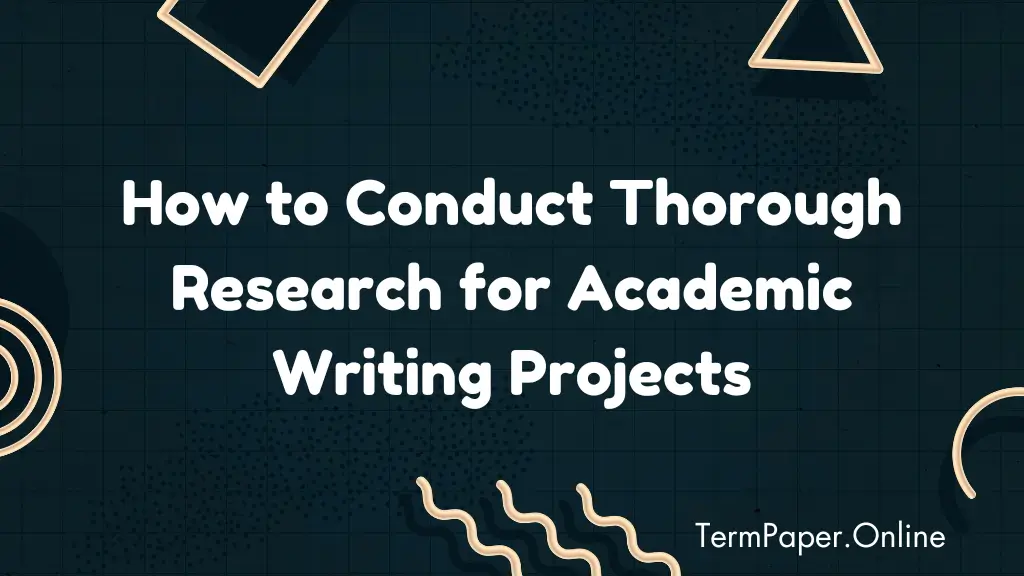How to Conduct Thorough Research for Academic Writing Projects
Posted By Admin @ 03/09/24
Posted By Admin @ 03/09/24

Academic writing demonstrates a student's knowledge and analysis. It would help if you did your research to write a respectable research paper, essay, or thesis. When term papers are at stake, researching might be intimidating. You can handle academic research difficulties with the correct strategy and resources. We'll cover how to perform thorough research in this article to help you succeed in academic writing.
Before starting research, remember that academic research is nonlinear. Each stage shapes your final paper. The research process starts with choosing a topic, then acquiring data, evaluating sources, organizing data, and producing the paper. By taking care of each step, you can ensure your research is complete and relevant to your academic goals.
The choice of topic is the initial step in any research endeavor. This can be the hardest step because your topic will influence the extent and direction of your research. Consider your interests, assignment requirements, and resources while choosing a topic. A good topic should be narrow enough for in-depth examination but wide enough for investigation.
If you need help choosing a topic, brainstorm or do preliminary research to find prospective interests. Asking your instructor or peers for advice can also help you choose. After choosing a topic, write a clear research question or thesis statement to guide your research.
After choosing a topic, gather information. This entails finding and using books, journal articles, websites, and other scholarly sources. To cover your issue thoroughly, gather a variety of information. Be selective and prioritize credible, dependable sources relevant to your study subject.
Conduct a literature review to obtain information. This involves finding and summarizing relevant research on your topic. A literature review helps you comprehend current knowledge on your issue and reveals research gaps your work may fill. Find relevant academic articles and books in JSTOR, Google Scholar, and your institution's library.
Primary sources like interviews, surveys, and archive materials can supplement scholarly sources. Primary sources provide depth and authenticity to your research with firsthand accounts and data. Be aware of primary sources' limits and biases and use them with secondary sources to balance the view.
Academic writing requires a thorough evaluation of each source to ensure legitimacy and relevance. Unreliable or biased sources can dramatically lower study quality. An effective source evaluation requires several critical factors. Examine the source's author's skills, credentials, and affiliations to determine their authority.
Next, check the information's accuracy and citations to other reliable sources. A neutral source without obvious biases or hidden intentions is also important. Make sure the content is current and represents the latest research and advancements in your field.
Finally, ensure the source is relevant to your research question or thesis statement and appropriate for your paper's academic level. By using these criteria, you can eliminate questionable sources and focus on those that can improve your research. Since academic writing requires correct references, take comprehensive notes and follow your sources.
After collecting and assessing your sources, organize your research. Your paper must be well-organized to flow logically. Organize your sources by topics, arguments, or major points related to your research subject. An outline or mind map can help you visualize your paper's structure and discover research gaps.
Organizing your research requires tracking sources and citations. This will help you write your paper faster and credit the original writers. Use Zotero or EndNote to organize your sources and generate proper citations.
After organizing your research, start drafting your paper. An introduction should include background information and your research question or thesis statement. The introduction should hook the reader and set the tone for the work.
Present your study findings and analysis in the paper's body. Each paragraph should support a specific claim using sources. Use direct quoting, paraphrasing, and summarising to effortlessly integrate your sources into your writing. Cite sources appropriately to avoid plagiarism.
Write clearly and concisely for your readers. Avoid jargon and complicated wording that could confuse readers. Check your paper's structure and flow to make sure each part makes sense.
Summarize your findings and analyze their ramifications to end your report. The conclusion should repeat your thesis and provide closure, ensuring the reader understands your research and its significance.
Academic research and writing are difficult, especially on complex or new topics. If you need help with any research task, ask. Professional writing services like TermPaper.Online helps many students. Both "write my term paper" and "term paper writer" services can aid you through the procedure.
We know how important it is to write rigorous academic papers at TermPaper.Online. Our specialist writers and researchers help students succeed by giving guidance and support. We're here to help you with "writing your term paper" or any other "term paper help" you require.
To ensure high quality, examine and rewrite your paper after your initial draft. Review the content for clarity, coherence, and consistency. Be sure your logic and arguments are solid. Take care to organize your paper and connect its sections logically.
Next, polish your paper's language and style. Check for grammar and spelling issues and write clearly. Avoid jargon and complex wording that could confuse readers. Be sure to properly cite and reference all sources.
Finally, ask classmates or teachers for feedback. A fresh perspective can reveal areas for improvement you may have missed. Make any necessary changes and perfect your paper with this input.
Successful academic writing requires considerable research. Following these instructions will ensure that your research is thorough, credible, and well-organized, resulting in high-quality academic work. Remember that research is iterative, so be flexible and open to new ideas. You can master academic research and write papers that stand out with careful planning, attention to detail, and perfection.
If you require support, use reputable sites like TermPaper.Online. Whether you need a "term paper writer" or help "writing your term paper," we can help you succeed academically.
